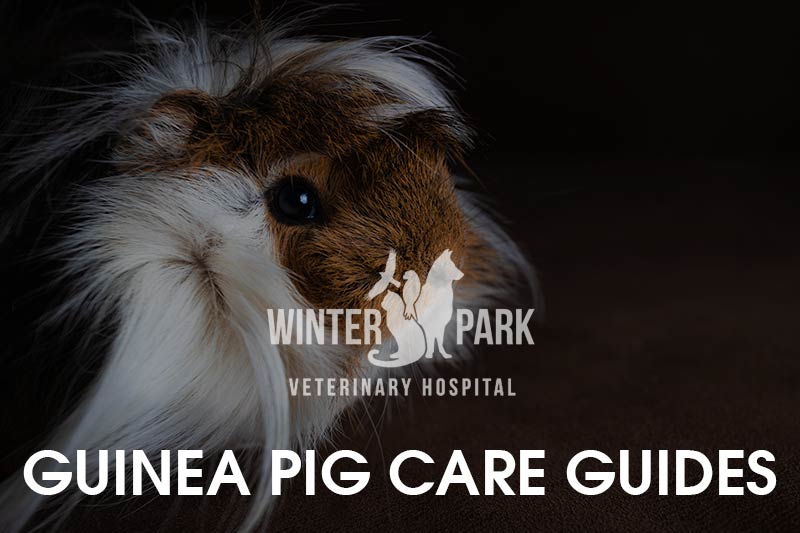Guinea Pig Diseases and Conditions Requiring Veterinary Care
Download this Care Guide – PDF
Malocclusion of Premolar Teeth (Slobbers)
A common problem of guinea pigs (especially those over 2 to 3 years old) results when the upper and lower premolar teeth (the most forward cheek teeth) meet improperly while chewing. In time, this problem results in abnormal wear of these teeth, injury to the tongue and (eventually) inability to chew and eat. Drooling results in a continually moist mouth and chin. Weight loss is dramatic.
Correction of the problem involves general anesthesia and aggressive filing or grinding of the teeth. Antibiotics, anti-inflammatory medications, and hand feeding for several days after the procedure may be necessary. There may be no complete cure for this problem; periodic trimming may be necessary. Do not breed guinea pigs with this problem to prevent passing this defect to the young.
Vitamin C Deficiency (Scurvy)
Guinea pigs cannot produce their own vitamin C and must receive it from their daily food. Deficiency causes scurvy (aka scorbutus). Proper diet with supplementation is essential. Scurvy can be treated with vitamin injections and an improved diet.
Symptoms: Poor appetite, swollen/painful joints and ribs, poor bone and tooth development, spontaneous bleeding from the gums, reluctance to move.
Difficulties During Birth
Dystocia: This life-threatening problem occurs most frequently in sows bred for the first time after 7 months of age. The young cannot pass through the birth canal and will often need to be delivered by caesarian section. Dystocia is a life-threatening emergency.
Symptoms: Straining, uterine bleeding, collapse, and death.
Pregnancy toxemia: This serious condition mostly occurs in overweight females in their first or second pregnancy. Symptoms are most common in the last week of pregnancy or the first week following delivery. Some sows have no symptoms and suddenly die. There is no single cause for toxemia, but obesity and stress are predisposing factors. Other factors include advanced age, a large number of fetuses and lack of exercise. The underlying problem is lack of blood supply to the uterus during pregnancy. Treatment is often unsuccessful — prevention is the key. Good nutrition and reduced stress (proper housing and quiet), as well as not breeding are paramount.
Symptoms: Poor appetite, depression, weakness, reluctance to move, uncoordinated movements, difficulty breathing, coma, and death.
Hair Loss
Hair loss or thinning of the hair is common in sows that have been repeatedly bred. These guinea pigs tend to lose more hair with each successive breeding. Weak, juvenile guinea pigs also lose hair around the time of weaning. “Barbering” occurs when guinea pigs dominate others of less status by chewing away the lower-ranking guinea pig’s hair. Younger guinea pigs are especially likely to be stripped of their hair due to dominance struggles. Some hair loss is due to fungal disease and parasite infestation (mites, fleas).
Heat Stroke (Stress)
Guinea pigs are especially susceptible to heat stress; those who are overweight or heavily furred even more so. Environmental temperatures above 85°F, humidity over 70%, inadequate shade or ventilation, stress and crowding all contribute to heat stress. Guinea pigs are cool-weather animals who require some environmental control to thrive in Florida. A fan blowing over the enclosure and plenty of shade (if housed on a porch or sunny room) are usually necessary. Air-conditioned homes typically provide the right environment, but are not enough for all guinea pigs. Guinea pigs showing signs of heat stress need to be cooled by wetting the ears, feet, and nose with plenty of water and brought to us immediately.
Symptoms: Panting, slobbering, poor appetite, refusal to move, seizures, death.
Cancer
Cancer is relatively rare in guinea pigs. It is most likely to strike older animals. The majority of tumors are benign (non-cancerous) and affect the skin and respiratory tract. Cancers have also been found in the blood (leukemia), reproductive tract and mammary glands. Treatment depends on the type and aggressiveness of the cancer.
Footpad Infections
Serious and sometimes crippling infections of the footpads occurs from housing on wire-floored cages. Wire causes almost constant scratching (abrasion) of the pads, leading to infection. Fecal soiling of the feet adds to the problem. Treatment consists of antibiotic therapy (oral and/or topical), bandaging of the feet, improved sanitation and better housing (solid flooring).
Symptoms: Lameness, bleeding and swelling of the feet.
Cervical Lumps
Abscesses in the lymph nodes immediately beneath the lower jaw usually result when coarse foods (such as hay) injure the lining of the mouth, or when the skin is injured near these nodes. Bacterial infection then creates painful abscesses under the jaw. Sometimes these abscesses open on their own, leaking a yellow/white, creamy pus. Treatment with antibiotics is usually curative, but very large abscesses may require surgical removal.
Pneumonia
Pneumonia is one of the most common bacterial diseases of guinea pigs. Several potential disease-causing bacteria may live in the respiratory tract of healthy guinea pigs. Stress, poor nutrition and improper sanitation may weaken the guinea pig, leading to a degenerated immune system. Illness quickly follows. Aggressive antibiotic therapy and supportive care are necessary. Some guinea pigs will show no symptoms before dying. Rabbits and rats harbor bacteria known to cause pneumonia in guinea pigs; therefore do not house together any combination of rabbits, rats and guinea pigs.
Symptoms: Labored or rapid breathing, lethargy, discharge from eyes or nostrils, poor appetite.
Bacterial enteritis
Numerous bacteria can cause infection of the gastrointestinal tract. Some of these bacteria come from unwashed or contaminated feed, greens or water. Supportive care and aggressive antibiotic therapy are needed.
Symptoms: Lethargy, weight loss, diarrhea (not always), and sudden death.
Ringworm
The same type of fungus that causes athlete’s foot in people also causes skin infection in guinea pigs. Treatment depends on the number and distribution of affected areas. Ringworm is transmittable to humans. Wash your hands well after handling an infected guinea pig (for treatment) and limit or prevent exposure to children during treatment.
Symptoms: Patchy hair losson the face, nose and ears, flaky skin along the trunk and spine or all of these.
Lice, Mites & Fleas
Guinea pigs may suffer infestations of lice, mites and fleas. These ectoparasites cause problems ranging from mild irritation to death.
Lice: Lice are wingless insects who live in the hair coat and feed off secretions caused by their abrasion of the pet’s skin. Light infestations are often unnoticed, but heavy infestations cause serious itching, scratching and hair loss. Lice can be transmitted from infested guinea pigs to others by direct contact or contact with infested bedding. Guinea pig lice are not transmittable to humans. Lice are often treated with shampoos, injections to kill the biting lice and complete replacement of all bedding, towels, etc. in the enclosure.
Mites: The guinea pig mange mite is related to the mite causing scabies in humans. These mites live within the outer layers of the skin and cause intense scratching and hair loss. The scratching can lead to serious damage to the skin and bacterial infection. Running in circles and convulsions have been reported but are rare. Mites are spread by direct contact. Some of these mites can bite humans, causing localized itching, but they do not infest humans and will soon die. Confirmation of the infestation is done by microscopic examination of skin samples taken by scraping the skin (sometimes in several areas). Treatment is by injections to kill the mites and antibiotic therapy if needed. Replace any wood shavings in the enclosure with soft paper or cloth towels for the guinea pig’s comfort until the mites are gone.
Fleas: These wingless insects suck blood by biting the skin. If the infestation is heavy, enough blood can be lost to cause anemia and death. Fleas can be removed with a comb or by careful use of flea shampoos (call us for a recommendation regarding flea-control products — some available shampoos can kill guinea pigs even if used according to label directions. There are NO products specifically made for use on guinea pigs). Replacement of the bedding is necessary to remove the flea larvae that live in the environment.
Intestinal Parasites
Intestinal worms are rarely a problem in captive guinea pigs. Infestation by a single-celled protozoan, Coccidia, occasionally occurs, causing diarrhea, dehydration, weight loss and weakness. This parasite is treated by oral medication. Pinworms also are found, but only rarely seem to cause illness.
Gut stasis
Strict herbivores, like guinea pigs, depend on indigestible fiber that keeps their digestive tract moving. When the speed that food moves through their body is altered the pet can develop Gut Stasis, which can cause impaction and possible death to the pet. Proper diet that includes high fiber grass hay like Timothy hay and fresh leafy greens that provide moisture and nutrients are good ways to prevent this from happening. If pet has never had greens introduce them slowly to the pet’s diet. Treating this in most cases requires hospital stay for monitoring and administering electrolyte fluids subcutaneously (under the skin) or intravenously (into the vein). This along with possible syringe-feeding high fiber diet and other medications will restore motility of the gastrointestinal tract and hydration of the pet.
Symptoms: Decrease appetite, drinking and behavior; anorexia, diarrhea, smaller and dryer fecal pellets, pain (hunched over, grinding teeth, antisocial behavior). Considered Emergency if pet has not eaten or produced fecal matter in 24 hrs.








